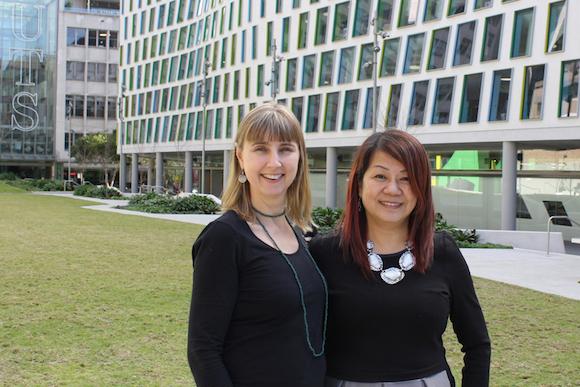Professor Regina Lee from PolyU was in Sydney recently as a KTP visiting fellow to work with Angela Dawson, Senior Lecturer in the UTS Faculty of Health, on mobile health (mHealth) initiatives aimed at young people.

Professor Regina Lee (right) with Dr Angela Dawson. Picture by Clare Donald
In summary:
- Academics from UTS and Hong Kong Polytechnic University are collaborating on a project to explore the use mobile technology in promoting adolescent sexual and reproductive health.
- During phase one of the project focus group interviews with adolescents in Hong Kong and Australia will be conducted to get their input and engage them in the development of the program.
A project that explores how mobile technology can help to promote adolescent sexual and reproductive health has led to collaboration between academics from UTS and Hong Kong Polytechnic University (PolyU).
Professor Regina Lee from PolyU was in Sydney recently to work with Angela Dawson, Senior Lecturer in the UTS Faculty of Health, on mobile health (mHealth) initiatives aimed at young people.
"We're using apps, text messages, games, decision trees and Facebook to prevent sexually transmitted infections and also to help delay sexual activity at an early age," Professor Lee said.
Lee's motivation for this project stems from years working as a paediatric nurse and her experience working in schools to promote child and adolescent health.
"When I was working in the hospital, I really didn't like seeing the sick kids. The nurses wait for them to come in and try to cure them. I thought, 'we can do something to prevent this'."
The mHealth project will target adolescents in junior high school using mobile technology that appeals to this age group. "I know it's not possible to try to prevent all children getting sick in the first place. But at least to minimise it, or even make it less traumatic for them," Professor Lee said.
"For example, obesity is an issue. You don't wait until children are obese, have a heart attack, or have hyperlipidemia. Instead, you tell them at the very beginning at school that they should pick up a healthy snack, develop healthy eating habits and do regular exercise. These are all the good things we can do in the early stages to prevent complications and chronic illnesses when they're older. That will also have a big impact on the healthcare system. If they're really healthy during adolescence, they will transition to a healthy adulthood."
During phase one of the mHealth project, Lee and Dawson will arrange focus group interviews with adolescents in Hong Kong and Australia to get their input and engage them in the development of the program.
"We're also looking at collaboration with industry, such as telecommunications and computer companies in Australia and Hong Kong. Technology is changing every day, so we need their input," Professor Lee said.
Lee came to UTS on a grant as part of the Key Technology Partnership (KTP) Visiting Fellow Program. It was also a chance to explore opportunities beyond the mHealth project such as facilitating a PhD exchange program.
"The KTP program is a really nice strategy to allow visiting scholars to be more focused. And talking face-to-face is really different to email," she said.
"I'm always so busy when I'm in Hong Kong, but it's been a very good opportunity for me to concentrate on the present project."

